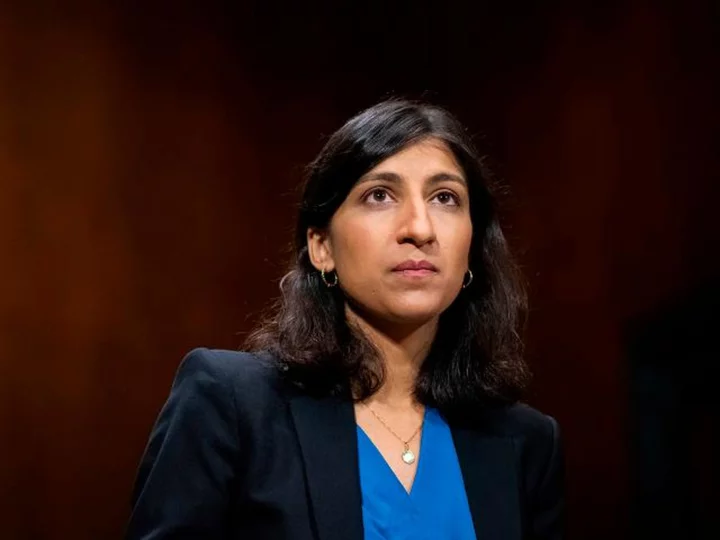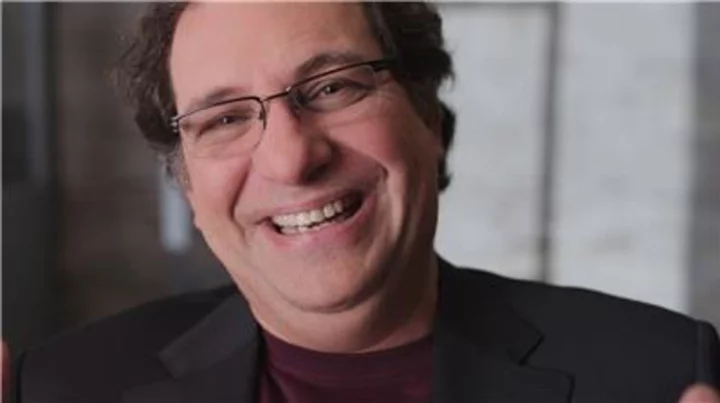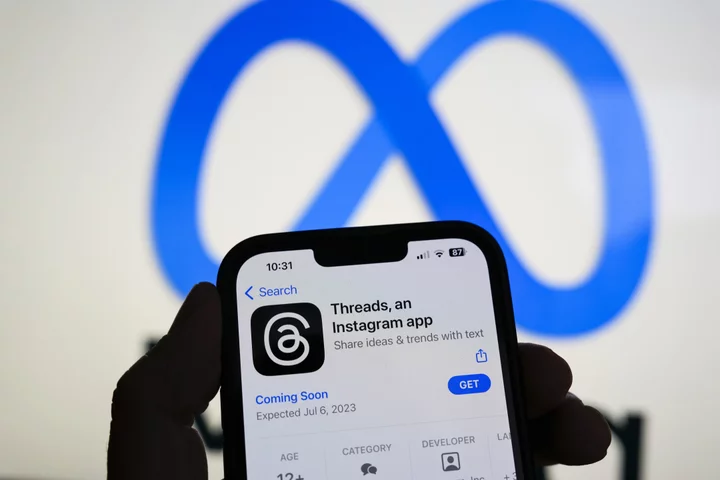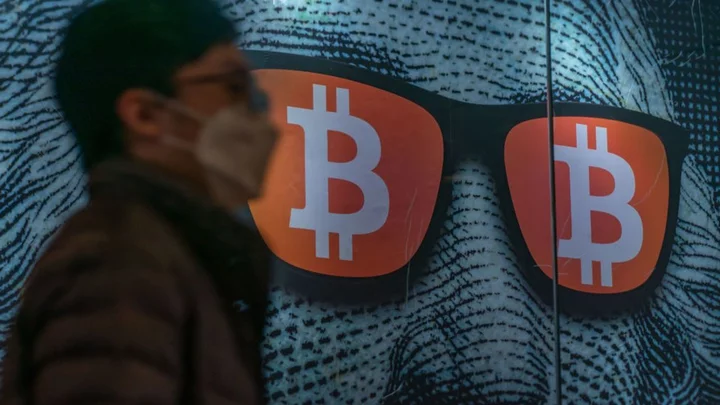When the Federal Trade Commission and 17 states sued Amazon last month in a landmark antitrust case, Lina Khan, chair of the FTC, described it as a "cutting-edge" lawsuit that captures "state-of-the-art thinking" about modern monopolies in the tech industry.
The closely watched case may be the biggest of the 34-year-old's career. It symbolizes the toughest regulatory challenge Amazon has faced in recent memory; for Khan, however, it is also the culmination of a years-long effort to challenge decades of received wisdom about how governments can protect competition, particularly in the tech sector.
If the Khan-spearheaded suit succeeds, it could mean huge changes for Amazon's sprawling e-commerce business. But perhaps even more meaningfully, it could become an important step toward Khan's larger goal: To broaden the scope of antitrust law and to encourage regulators and courts to apply it more creatively in shaping the entire global economy.
The Amazon suit isn't Khan's only effort to rein in Big Tech. Other ongoing suits have targeted industry giants including Microsoft and Meta, the latter on multiple fronts. It's a huge gamble, spending gobs of taxpayer dollars and pitting small teams of government lawyers against the world's most powerful and deep-pocketed corporations.
The point of it all, Khan told CNN in a recent interview, is to bring more of the government's resources to bear on the daily economic problems of ordinary Americans.
"What we hear day-in, day-out is that people too often feel like they're not getting a fair shake in the market," Khan said. "There's more and more public awareness about [how] decisions the FTC is making on antitrust or consumer protection are affecting people in their day-to-day lives."
If her push pays off, Khan could become one of the most consequential FTC chairs in history. But, two years into her tenure, she is up against determined opponents in business and law, and a mixed record in court that her critics say is evidence of her folly.
She may also be running out of time. Khan's term expires next September. And should a Republican should win the White House in 2024, or should President Joe Biden win reelection and choose another FTC chair, her time at the agency helm could soon come to a close. In the interview, Khan acknowledged she would step aside if a new administration sought to replace her. "That's the president's prerogative," she told CNN.
For now, at least, Khan leads an agency that has a dizzying number of active investigations, lawsuits and regulatory proposals on the table. Many of them aren't close to being resolved, and some may not reach a conclusion until long after she is gone. But her supporters and critics agree: From the beginning, Khan has helped spark a global debate about the power of technology companies and the role governments play in regulating them.
"Everybody in our field, they know who Lina Khan is, and they know about her ideas," said William Kovacic, a former FTC chair during the George W. Bush administration.
Challenging decades of orthodoxy
Khan's path might have turned out differently had it not been for Barry Lynn, an early mentor who hired Khan in 2011 not long after her graduation from Williams College.
In their initial conversations, Lynn recalled, Khan seemed to have an intuitive grasp of how corporate control of markets could have important effects on everything from workers to consumers.
One of Khan's first projects at Open Markets — at the time part of the Washington think-tank known as the New America Foundation — was an in-depth study of Amazon and its impact on authors and book publishing — a line of inquiry that would come to define her career and led to a viral 2017 law article she wrote about Amazon's economic dominance.
But she also explored other topics, including chicken farming. That led to a 2012 article in The Washington Monthly arguing the Obama administration failed to act decisively enough to stop large poultry processors from exploiting independent chicken farmers on a vast scale.
Even in those early writings, Khan's critical view of the status quo was emerging — questioning the government's reluctance to sue meat processors amid fears that litigation could lead to damaging court losses.
"One wonders," she wrote, "whether the administration's actions—taken as a whole—did not set the farmers back as much as would a loss in court."
That appetite for litigation has persisted. Khan has consistently indicated a preference, if not a zeal, for taking companies to court. Even losing could still help more broadly, she has argued, if it convinces Congress to update the laws in response to new competitive harms.
Driving her convictions, Lynn said, is a powerful sense of justice, as well as a "healthy sense of anger."
"I remember one day sitting around talking," Lynn recalled of the chicken farming story. "She was like, 'What these people are doing, it's just wrong ... It's insulting, because it is intellectually so unjustifiable.'" (Khan said she did not recall saying those exact words but agreed with the overall sentiment.)
Khan blamed the farmers' plight on Reagan-era policymakers who pushed to reinterpret antitrust law primarily through consumer prices instead of a broad spectrum of shared societal values — a move she said promoted consolidation, reduced competition (and accountability) among meat processors, and enabled the farmers' abuse in the first place.
That shift in legal doctrine was profound, shaping how courts have applied antitrust law ever since.
Defenders of the change have argued it's led to decades of cheaper prices for consumers and created more stability for businesses.
Khan and her allies have argued, by contrast, that an excessive focus on price overlooks how companies might harm competition in less obvious ways, affecting everything from labor markets to product quality to consumer privacy.
Khan's ideas have challenged the closest thing to a sacred cow in antitrust law. Now, armed with the power to investigate companies and to frustrate mega-deals, she is betting big and taking on America's richest businesses to test her vision for a more expansive form of monopoly enforcement.
"She's sort of trying to overturn a very well-entrenched orthodoxy," and "decades worth of court decisions that have been influenced" by it, said Robert Hockett, another early mentor of Khan's who now teaches at Cornell Law School. "It's a tough road to hoe."
Khan takes aim at Big Tech
While still a law school student, Khan and her 2017 article on Amazon — published in the Yale Law Journal — championed a unique approach to antitrust policy and sparked a new explosion of academic research on the topic.
It also caught the eye of lawmakers trying to find new ways to reel in the dominance of America's powerful technology companies.
In 2019, when he was staffing up a landmark investigation of Big Tech, Rhode Island Democratic Rep. David Cicilline deliberately sought out Khan. By this time, her paper on Amazon had already taken the academic world by storm, and he believed hiring her could amplify what he saw as the first antitrust probe performed by Congress in half a century.
"I knew that if we could bring Lina into the investigation, it would really elevate people's expectations," Cicilline told CNN in an interview.
With Khan's help, the 16-month investigation produced a 450-page report concluding tech giants enjoyed unchecked "monopoly power" that led to a raft of legislative proposals. The most ambitious of those never became law, but Khan's role in the probe, which Cicilline described as "critical," helped further raise her profile.
In 2021, a few months after the House report was released, the recently elected Biden announced Khan would not only serve as an FTC commissioner but would leapfrog the agency's existing members to become its most senior appointee.
In office, Khan has embarked on an ambitious program not only to scale up US antitrust and consumer protection enforcement but also to expand the scope of the law in new ways.
In addition to last month's Amazon suit, the FTC under Khan has sued the company for allegedly tricking users into signing up for its Prime service and convinced Amazon to adopt multimillion-dollar privacy settlements surrounding its Alexa and Ring home devices.
Khan has continued an FTC lawsuit filed during the Trump administration that seeks to break up Facebook-parent Meta. She sought to prevent Meta from buying a virtual reality startup, Within Unlimited, and, in a rare move, to revisit and expand the scope of Meta's historic $5 billion Cambridge Analytica settlement to cover children's personal data.
Khan also brought Microsoft back under the antitrust microscope for the first time since the turn of the millennium, pushing to block the company's $69 billion acquisition of gaming giant Activision Blizzard.m
Since Khan's appointment, the FTC has investigated or sued to block more than three dozen proposed mergers, said agency spokesperson Douglas Farrar, which in turn has led to 17 settlements, 17 deals being abandoned by the companies and one — the Within Unlimited case — where the FTC has conceded in the courts.
Some of those cases reflect stepped-up enforcement against vertical mergers, a type of deal involving companies in different lines of business that critics including Khan have said were largely ignored in recent decades due to an excessively narrow focus on consumer prices.
In one of her most significant policy moves, Khan and her Justice Department counterpart, Jonathan Kanter, have worked to revamp the federal guidelines that describe how and when the US government may consider a merger to be illegal, including, for the first time, how a merger's impact on worker pay and benefits may affect a deal's overall legality.
Other major steps Khan has taken include proposals to ban noncompete clauses in employer agreements the FTC estimates have cost American workers $250 billion a year.
Khan has also made data privacy issues a priority. In a pair of record-breaking settlements, Epic Games, the maker of "Fortnite," agreed to pay more than half a billion dollars to resolve allegations it tricked players — including children — into making unintended purchases within the game. And after the reversal of Roe v. Wade, the FTC has made a point of highlighting how it is paying attention to the misuse of reproductive health data.
What she's up against
Along the way, Khan has faced several high-profile court setbacks, including in some of the aforementioned cases, that have given her opponents more ammunition.
"You are now 0 for 4 in merger trials. Why are you losing so much?" demanded California Republican Rep. Kevin Kiley at a House oversight hearing this summer. "Are you losing on purpose?"
Earlier this year, the FTC gave up its Within Unlimited case against Meta after a federal judge declined to block the merger. The rejection dealt a blow to the FTC's novel legal theory that Meta was trying to thwart future competition in a developing market for virtual reality tech. And federal courts have twice rejected the FTC's bid to halt Microsoft's Activision merger, which officially closed last week after being approved by UK regulators.
In her interview with CNN, Khan said she was "quite happy" with the FTC's merger work and cited as success feedback she's received from business leaders about the agency's "deterrent effect."
"We've heard that executives are taking much more seriously the potential antitrust risks of deals on the front-end," she said, adding that "deals are not being pursued because they're recognized on the front end as being legally suspect."
Beyond the litigation, many of Khan's proposed rules are bound to invite legal scrutiny. Topping the list is the FTC's draft rule to ban noncompetes, said Kathleen Bradish, acting president of the American Antitrust Institute.
"If they try to implement this rule, it's going to be tied up for a while in the courts," said Bradish, who has otherwise supported the FTC's tougher competition agenda.
Khan's corporate opponents argue that the very record that cemented her reputation should disqualify her. Amazon and Meta have both pushed for Khan to recuse herself from matters involving the companies, questioning her objectivity.
Khan resisted those calls, saying she has never prejudged any case or set of facts and that she has no financial conflicts of interest that would necessitate a recusal. Last year, the judge presiding over the FTC's case to break up Meta ruled Khan did not have to recuse herself from that case, because, among other things, Khan's views on antitrust policy did not amount to a "personal animosity" that would legally disqualify a prosecutor.
Khan's critics are not limited to those outside the FTC; its two Republican commissioners have stepped down after objections to her handling of the agency. One of the two GOP commissioners, Christine Wilson, resigned in February in protest, accusing her in an op-ed not only of bias against companies like Meta but also of governmental power grabs. (Wilson did not respond to requests for an interview; Khan responded to Wilson's departure with a joint statement alongside the agency's two other Democrats thanking her for her service. The other former GOP commissioner, Noah Phillips, declined to be interviewed.)
'A generational change happening'
The lawsuit the FTC filed last month against Amazon is a far more streamlined set of arguments than critics have lobbed at the company in the past.
It focuses on Amazon's use of allegedly unfair tactics to ensure it always offers the lowest prices on the internet and to encourage sellers to purchase Amazon's own fulfillment services. The case makes no claims of liability due to use of seller data, alleged predatory pricing, past mergers or its cloud computing business, all of which figured prominently in either the congressional report Khan helped author, her 2017 paper or both.
If there is any discrepancy between her earlier work and last month's lawsuit, Khan told CNN, it can be chalked up to two things: investigative access that Khan didn't have as a law student and changes in industry practices since 2017 and even since 2019 when she worked on Capitol Hill.
"Your entire understanding of what's going on beneath the hood is going to look different than when you're on the outside doing independent research," Khan said. More generally, she added, the suit by the FTC and the states "is about tactics that Amazon is engaging in today."
Whatever Amazon may have done in the past, she argued, it is now in an "extraction mode" that illegally siphons value from consumers and independent sellers by anticompetitive means.
Amazon has said the case is "wrong on the facts and the law," and a trade group that represents the company, NetChoice, argues that Khan's track record shows she has already fallen flat on the lofty expectations of systemic change that accompanied her confirmation.
"They aren't picking good cases," said Carl Szabo, NetChoice's vice president and general counsel. "It's not making smart bets."
"There's no reason to think her motives are anything other than genuine," Szabo added. "Unfortunately, the effects of her actions just happen to produce bad outcomes."
Many of Khan's policy initiatives — as for any agency chief — could take multiple administrations to stick, and only if those future administrations remain committed to initiatives like Khan's draft merger guidelines and noncompete rules.
Several legal experts drew sports analogies: Khan is still in the early innings, some argued. To win more matches requires playing more and being willing to lose, another said. And a third argued that securing wins is critical to boosting team morale.
Whatever happens in the courts, though, Khan has created a durable change in how people talk about competition, according to Kovacic.
"All of a sudden, the upholders of the status quo look old and tired to me. There's truly a generational change happening," Kovacic said. "I think that's going to last."









